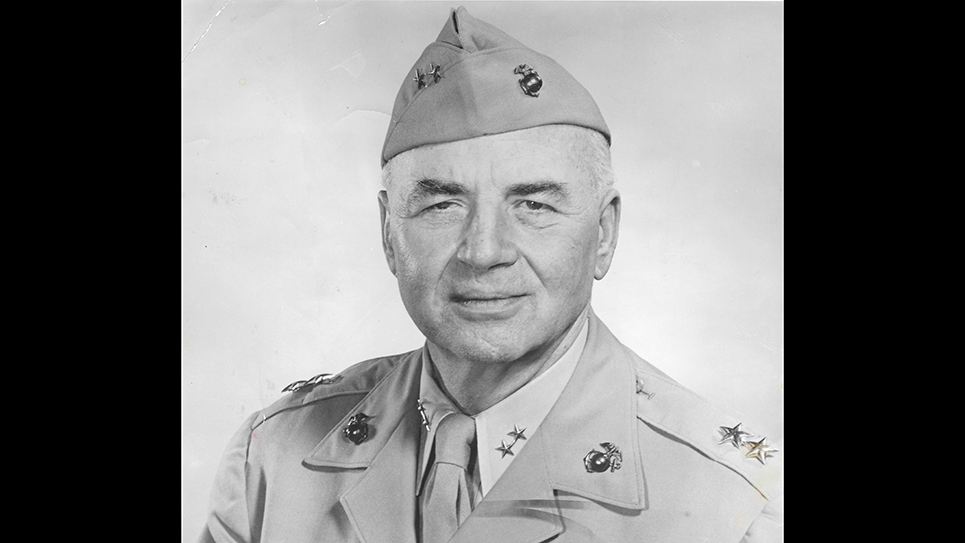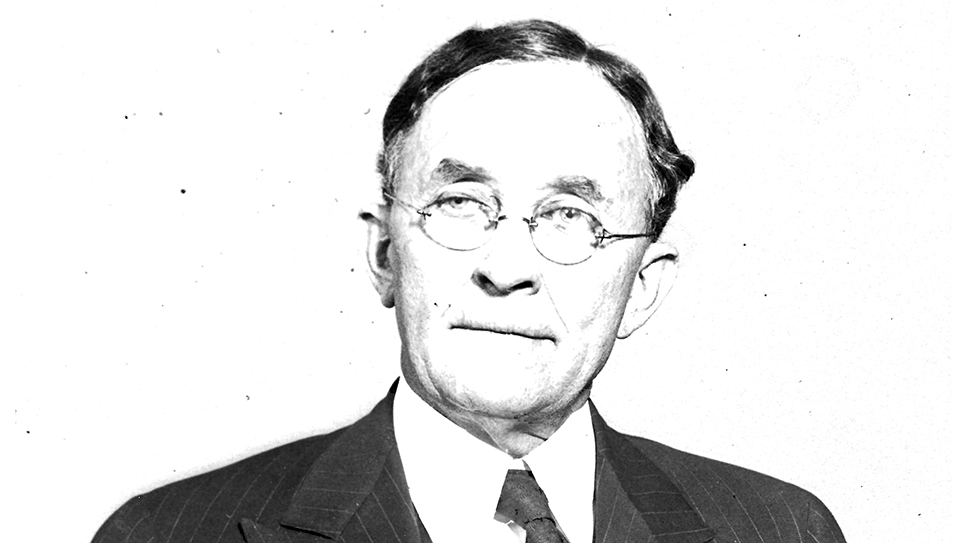The Gentleman From Minnesota: Melvin Maas
I would be surprised if a single reader has ever heard of Melvin J. Maas, but his was a truly remarkable life. A pilot during both World Wars, Maas was at various times a soldier, a congressman and a businessman. Blunt and outspoken, Melvin Joseph Maas was a man of convictions as well as courage.
An early advocate of the importance of air power, Maas once buzzed the Capitol building in a bi-plane while President Herbert Hoover was on the grounds to make his point. A member of the Naval Affairs Committee in the House of Representatives, Melvin Maas was the sponsor of the legislation that created the Naval Reserve as well as the first women’s reserve for the United States military.
When another general told the blind Maas, “You must be the first blind general ever to be on the active list,” the former congressman demurred. “I’m just the first one to admit it,” Maas replied. Maas loved a good cigar and was known for smoking as many as twenty in a day.
“I never read so much when I had my eyes,” Maas liked to tell audiences. “But I’ve read some 500 books since I’ve been blind.”
The House of Representatives was in session when “a pale, pinched young man” threw a leg over the railing of the House gallery, and while waving a .38 caliber pistol, screamed, “I demand 20 minutes to address the House! Whoever tries to stop me will die. Is that understood? I want to be heard.”
The man with the revolver was Marlin Kemmerer, a 25-year-old from Allentown, Pennsylvania, who worked in the sporting goods department of a Sears, Roebuck and Co. store. Later it came to light that Kemmerer was indeed an expert marksman.
Congressmen were milling about the floor of the House as a clerk was taking a teller vote on an amendment to an appropriation bill. Perhaps one hundred congressmen were gathered below the House gallery, and many panicked at the sight of the gunman waving his pistol and darted for the cloakrooms. Others rushed to hurl themselves beneath the safety of tables. Melvin J. Maas, recently defeated in the election, calmly stood looking up at the young man in the gallery. Maas walked over to stand directly beneath the gunman and said, “All right, son, you can have the floor and make your speech. But you can’t do it with that gun in your hand. Come on, drop it down to me.” Other reports of the day indicated Maas told the young man it was against the House rules to speak on the floor of the House, gun in hand. In any event, Maas continued to coax the young fellow. “Throw me your gun, that’s a good fellow,” Maas said. Everyone witnessing that extraordinary event let out their breath when the young man dropped the revolver, cocked, and fully loaded into the hands of Congressman Melvin J. Maas.
Congressman Fiorello LaGuardia was one of those who burst into the House gallery and tackled Kemmerer from behind. Kemmerer went to a hospital for observation and a much-needed mental evaluation. Police found two sticks of dynamite in his room at a local boarding house, as well as a 10-page screed in his pocket. “You need a gun these days to get the right to make a speech,” Marlin Kemmerer explained.
For his bravery, Melvin Maas was awarded the Carnegie Medal.
Maas had been active with the Marine Corps until 1925 when he received a commission and remained a member of the reserve. Maas worked with his brothers in a prosperous insurance business and his first foray into politics was urging a modification of the existing prohibition law. Maas argued for allowing folks to drink beer and wine, a highly popular notion in Minnesota, home to many people of Scandinavian and German descent. That political activity led Melvin Maas to challenge Congressman Oscar Keller in the GOP primary. Maas won both the primary and general elections in 1926 and was the youngest member of Congress at 28.
Maas was popular inside Minnesota’s Fourth Congressional District, but in 1932 every member of the House delegation was forced to run statewide due to the legislature’s inability to adopt a proper redistricting plan. A Republican, Maas lost that election but became a candidate once again in 1934 when the legislature did its job and finished redistricting. Maas was reelected to the House of Representatives. Every two years Maas was routinely reelected by the people who knew him best.
As might be expected of a state with a huge population of Nordic descent, folks in Minnesota were quite wary of American participation in another European war. Both of Minnesota’s United States senators, Henrik Shipstead and Ernest Lundeen, were fierce noninterventionists. So, too, were most of those Minnesotans serving as members of the House delegation. Like the great majority of the people he represented, Melvin J. Maas was also a noninterventionist. In 1940, Congressman Maas spoke over the radio against providing aid to Great Britain as it carried too great a risk to the United States becoming involved in the war for which the Minnesotan said the country was “disgracefully unprepared.”
Maas, as a member of the Marine Corps Reserve, was called back into active service and became a member of the staff of Admiral William “Bull” Halsey. Eventually, Maas was transferred to the staff of the commander of the Pacific Theatre of the war, General Douglas MacArthur. Maas was awarded the Silver Star for his participation in a flight mission where he manned the gunning position of a bomber, which dropped desperately needed food and supplies to US troops.
Melvin Maas remained in the Pacific until President Roosevelt as commander-in-chief, ordered all congressmen and senators back to Washington, D.C. That year Maas faced three candidates in the general election; a Farmer-Labor Party candidate, a Democrat and a Communist. Maas won easily, polling better than 65% of the vote.
Following four months’ service in the Pacific Theatre of the Second World War, “the florid, dumpy little Congressman from Minnesota” came home profoundly disturbed by what he regarded as “bungling” by the Navy. Maas made an appointment to see the president and while received cordially by Franklin Roosevelt, the congressman was dismayed by the lack of FDR’s response. Similar visits to Secretary of the Navy Frank Knox, a fellow Republican, and Admiral King were equally unsatisfactory to Maas. Finally, the congressman concluded to air his concerns over the radio in a nationally broadcast speech. When word reached the Navy Department of Congressman Maas’s intentions, officials urged him not to make the speech. Melvin Maas made it anyway.
“The public has been misled all along on the status of our military and naval operations in the Pacific,” Maas thundered. “Unjustified optimistic releases created the impression that all was proceeding well in our war with Japan … Defeats and disasters have been … announced as successes and victories for our forces.” According to the most widely read news magazine of its day, TIME said the congressman did make one change in his address requested by Navy Department officials. The sentence was originally written as, “We are still losing the war in the Pacific.” That was revised to read, “We are still not winning the war in the Pacific.”
The official reason for not broadcasting some aspects of the war was the desire not to reveal any information to the enemy that might be helpful. Congressman Maas worried something worse was behind the lack of candor. “Possibly the motive for the policy of mishandling war facts is to keep from stirring up the people and Congress, in the fear that the people, through Congress, might force some reforms on the executive bureaus.”
“When are losses are admitted, it is long after they occur,” Maas complained, “and whether by design or mere repeated coincidence, such losses are almost always made public coincident with the announcement of some success, or at least optimistic prediction from Washington, thus softening the blow … Such officials just don’t understand Americans. We can take it!”
Congressman Maas ran again in 1944 and faced harsh criticism from his opponent Frank Starkey, who accused the incumbent of being an isolationist. Maas had accused President Roosevelt of having had prior knowledge of the attack on Pearl Harbor by the Japanese days before voters went to the polls. Congressman Maas had said it was apparent “the investigation reports were being suppressed.” Maas said the White House had knowledge of the pending attack but failed to warn the base. Frank Starkey barked Maas would have been arrested for making false statements about Pearl Harbor had he not been a member of Congress.
Although Maas had been routinely reelected from his district, which covered St. Paul, it was due to his attention to his constituency and personal popularity. President Franklin D. Roosevelt was also quite popular in Minnesota’s Fourth Congressional District. In an election post-mortem, the Minneapolis Star-Tribune noted when Maas made his accusations, his voice had real authority behind it due to his service in the Pacific. Unfortunately, the newspaper reported his charges had fallen “on deaf ears.” The Star-Tribune thought it would have been better had Mel Maas not made any speeches at all during the campaign. The paper thought the people of Minnesota’s fourth Congressional District “simply refused to believe him.” Not only that, but they “got so mad that they turned against him by thousands, and relegated him to private life.”
As it was, while Melvin Maas lost to Frank Starkey, he had run a close race. The Star-Tribune marveled the Democratic candidate had not won by a bigger majority.
Melvin J. Maas never looked back. He returned to the war and was involved in the bloody Battle of Okinawa. Maas was named the commander of the Awasa Air Base. After his return to the United States in 1946, Melvin Maas served as a special advisor to the House Naval Affairs Committee. Maas then joined the business world, serving as an executive in the Sperry Corporation in New York City. Melvin Maas was also an owner and director of the Maas–Keef Company, a manufacturing concern.
As the sun began to set and shadows started to fall across the grounds of the Pentagon, Brigadier General Melvin Maas, completely blind for the last eight months, stood at attention “reviewing” an honor parade to mark his retirement. General Lemuel C. Shepherd and Mrs. Maas pinned another star to the uniform of the former congressman for his rank of major general. Melvin Maas would retire with that rank but would also remain as the member of the U.S. Marine Corps for the Department of Defense’s Reserve Policy Board.
As a result of facial wounds inflicted by an exploding enemy bomb suffered on Okinawa, Melvin J. Maas lost his eyesight in August 1951. For the rest of his life, Maas would be totally blind. Yet his service to others and his country was not done. Since 1949, Maas had been appointed to the President’s Committee on Employment of the Physically Handicapped. Melvin Maas remained a member of that committee for the rest of his life. Maas served as chairman of the committee from 1954-1964, working without compensation. In 1955, Maas had been elected national commander of the Disabled American Veterans.
Suffering from heart disease, hardening of the arteries and diabetes, Maas entered Bethesda Naval Hospital. Melvin J. Maas died April 13, 1964, at age 65. As befitting one who had been awarded the Purple Heart, the Legion of Merit and the Silver Star, Melvin J. Maas was laid to rest in Arlington National Cemetery.
President Lyndon Johnson issued a statement following General Maas’ death. “He has shown us how to live in the face of adversity, his courage and conviction have enriched us all.” LBJ noted Maas “taught himself a new existence without sight, traveled the world over and inspired people everywhere about the capacities and abilities of the handicapped.” Most importantly, President Johnson acknowledged, “Arthritis crippled his limbs, and massive heart attacks limited his mobility; yet his spirit was whole; his spirit was never disabled.”
© 2025 Ray Hill







